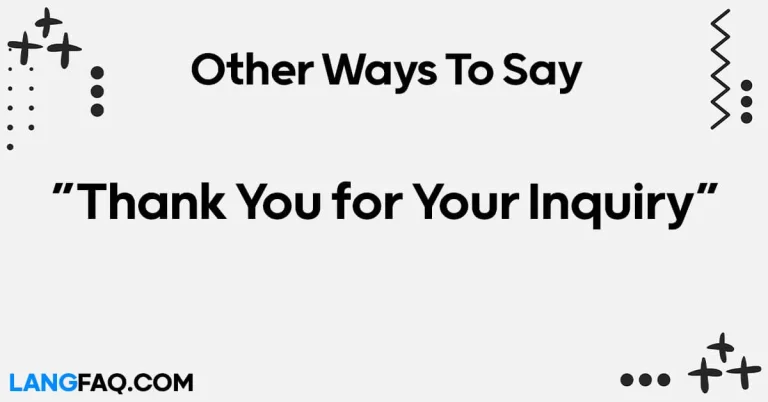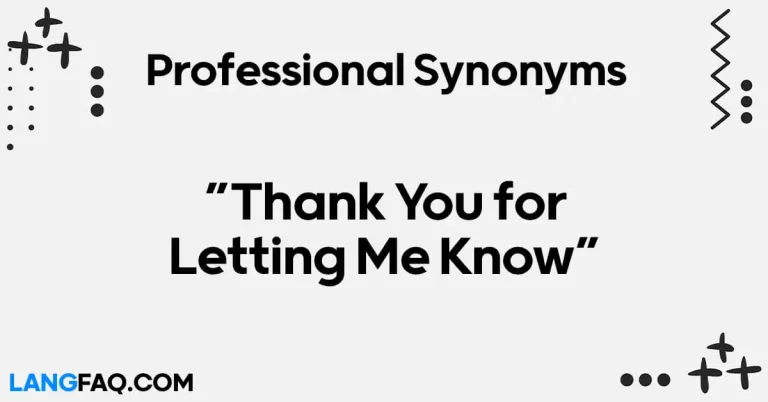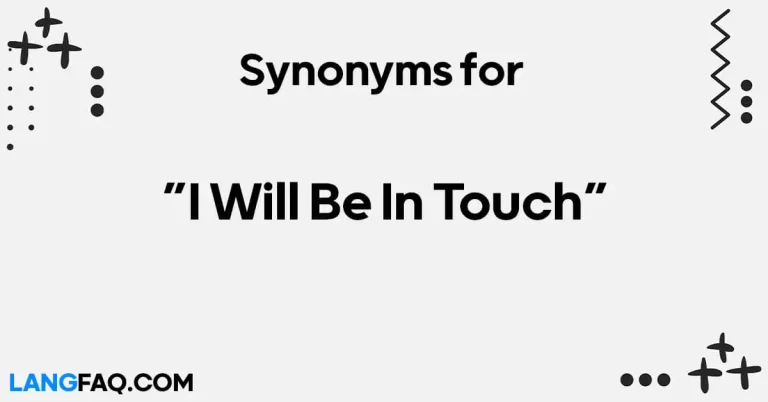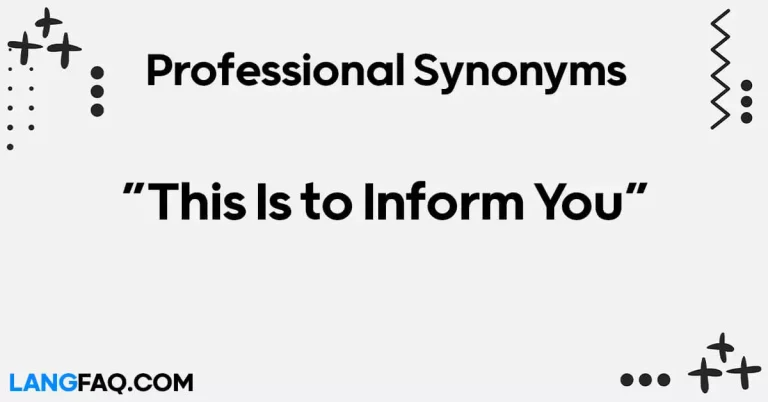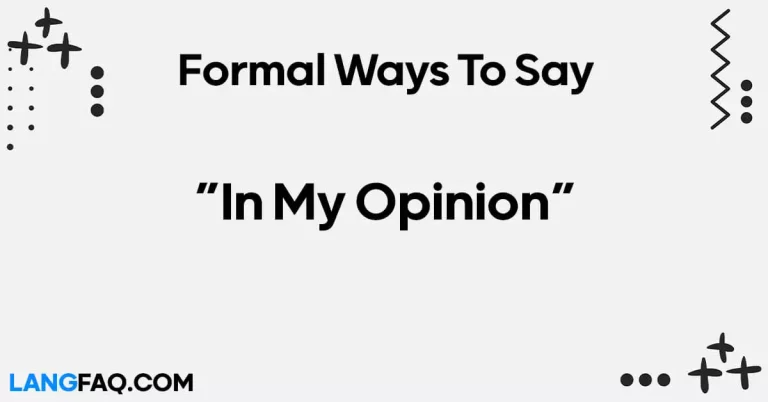In the realm of effective communication, the significance of varied expressions cannot be overstated. Diversifying your vocabulary not only adds richness to your language but also amplifies the impact of your message. In this article, we delve into 12 alternative ways to convey the need for additional information, exploring how each phrase can enhance communication and engagement.
12 Other Ways to Say “For More Information”
Here are 12 alternative expressions for “For More Information”:
- For further details
- To learn more
- To delve deeper
- To explore further
- For additional insights
- To find out more
- To uncover more
- For a deeper understanding
- To gain further knowledge
- For additional context
- To discover more
- To obtain more information
Here’s the table with meanings and examples for the alternative expressions of “For More Information”:
| Expression | Meaning | Example |
|---|---|---|
| For further details | Additional or more detailed information | Please refer to the user manual for further details. |
| To learn more | To acquire additional knowledge | Visit our website to learn more about our products. |
| To delve deeper | To investigate or explore further | Let’s delve deeper into this topic during the meeting. |
| To explore further | To investigate or examine more closely | We encourage you to explore further before deciding. |
| For additional insights | Extra or supplementary information | Contact our support team for additional insights. |
| To find out more | To discover additional information | Attend the seminar to find out more about the project. |
| To uncover more | To reveal or discover more | The investigation aims to uncover more evidence. |
| For a deeper understanding | For a more thorough comprehension | Read the book for a deeper understanding of the topic. |
| To gain further knowledge | To obtain additional understanding | Join the workshop to gain further knowledge on the subject. |
| For additional context | For more background or perspective | We need more information for additional context. |
| To discover more | To find or uncover additional details | Explore the museum to discover more about ancient artifacts. |
| To obtain more information | To acquire or receive more details | Submit the form to obtain more information about the event. |
Expanding one’s vocabulary with diverse expressions for “For More Information” not only enriches communication but also offers versatility in conveying the need for additional details. By incorporating these alternative phrases into your language repertoire, you can effectively engage with others and enhance the clarity and depth of your message.
Is It Correct to Say “For More Information”?
Yes, “For More Information” is a correct phrase in English.
It is commonly used to indicate that additional details or further explanations are available for a particular topic, product, service, event, or inquiry.
This phrase is often used in written and verbal communication to encourage individuals to seek out additional information if they require more details or clarity on a specific subject matter.
It serves as a prompt or invitation for individuals to learn more about the topic at hand.
Professional Mail Example With “For More Information”
Subject: Inquiry Regarding [Product/Service/Topic]
Dear [Recipient],
I hope this email finds you well.
I am writing to inquire about [product/service/topic] and would appreciate your assistance in providing further details. I have reviewed the information available on your website, but I would like to learn more about [specific aspect or feature].
Could you please provide additional information regarding [specific aspect or feature]? I am particularly interested in understanding [specific detail or benefit].
Thank you in advance for your prompt attention to this matter. I look forward to hearing from you soon.
Best regards, [Your Name]
For Further Details
When you require additional or more detailed information beyond what is currently provided, using the phrase “For Further Details” can effectively convey your need. This expression implies a desire for comprehensive information or clarification on a specific topic.
Formal Context: In a professional setting, such as when requesting additional information on a project or proposal, using “For Further Details” maintains a professional tone while clearly expressing your need for more information.
Informal Context: When planning an event with friends or family, you might use “For Further Details” to indicate that more information is needed to finalize plans, such as venue details or timing.
Example Sentence:
- Formal: “Could you please provide me with the financial projections for Q4? I require them for further details in my report.”
- Informal: “Hey, could you send me the address of the restaurant for further details? I want to make sure I have the right location.”
Email Sample:
Subject: Request for Further Details Regarding Project Proposal
Dear [Recipient],
I hope this email finds you well. I am currently reviewing the project proposal you submitted and would like to request further details regarding the implementation timeline. Could you please provide a breakdown of the proposed timeline for each phase of the project?
Your prompt attention to this matter would be greatly appreciated.
Thank you, [Your Name]
Variations:
- Colleagues: “Could you provide more information about this?”
- Friends: “Can you tell me more about it?”
- Mentor-Mentee: “Could you elaborate on this point?”
Pros:
- Clearly communicates the need for additional information.
- Maintains a professional tone in formal contexts.
Cons:
- May sound formal in casual settings.
Dictionary Insight: According to the Cambridge Dictionary, “Further” means “additional or more than before in amount, level, or distance.”
Usage Tips: Use “For Further Details” when you require specific and detailed information on a topic, especially in professional or formal contexts.
Related Grammar/Usage Rules: The phrase “For Further Details” is often used as a polite request for more information and is commonly followed by a specific inquiry or question.
To Learn More
“When you want to acquire additional knowledge on a subject, the phrase ‘To Learn More’ serves as an invitation for deeper exploration or understanding. This expression encourages further study or investigation into a topic of interest.
Formal Context: In an educational or professional setting, such as during a training seminar or conference, using “To Learn More” indicates a desire to gain additional insights or expertise on a particular subject matter.
Informal Context: When discussing a hobby or personal interest with friends or family, you might use “To Learn More” to express your enthusiasm for delving deeper into the topic and discovering new information or techniques.
Example Sentence:
- Formal: “Attend our webinar to learn more about the latest advancements in digital marketing strategies.”
- Informal: “I’ve been gardening for years, but there’s always something new to learn. Let’s explore some gardening blogs to learn more.”
Email Sample:
Subject: Invitation to Learn More About Sustainable Practices
Dear [Recipient],
I am excited to invite you to join us for a webinar next week where we will be discussing sustainable practices in the workplace. This is an excellent opportunity to learn more about how small changes can make a big impact on the environment.
We hope you can join us for this informative session.
Best regards, [Your Name]
Variations:
- Colleagues: “Let’s delve deeper into this topic during our next meeting.”
- Friends: “I’m curious to learn more about your trip. Can you share some stories?”
- Mentor-Mentee: “I encourage you to explore this topic further to gain a deeper understanding.”
Pros:
- Encourages continuous learning and self-improvement.
- Can be used in both formal and informal contexts.
Cons:
- May sound overly formal in casual conversations.
Dictionary Insight: According to the Cambridge Dictionary, “Learn” means “to get knowledge or skill in a new subject or activity.”
Usage Tips: Use “To Learn More” when inviting others to expand their knowledge or understanding of a particular topic, whether in a professional or personal context.
Related Grammar/Usage Rules: The phrase “To Learn More” is often used to introduce opportunities for further education or exploration, such as workshops, seminars, or online resources.
To Delve Deeper
When you want to investigate or explore a topic further, the phrase “To Delve Deeper” conveys your intention to delve into the intricacies or complexities of the subject matter.
Formal Context: In a research or academic setting, such as when discussing findings or analyzing data, using “To Delve Deeper” indicates a commitment to thorough examination and understanding of the topic.
Informal Context: When engaging in a stimulating conversation with peers or colleagues, you might use “To Delve Deeper” to express your interest in exploring deeper insights or perspectives on a particular issue.
Example Sentence:
- Formal: “Our study aims to delve deeper into the socioeconomic factors influencing healthcare disparities.”
- Informal: “That’s an interesting point you raised. Let’s delve deeper into it and see where the discussion leads.”
Email Sample:
Subject: Invitation to Delve Deeper into Climate Change Solutions
Dear [Recipient],
I hope this email finds you well. I wanted to reach out to invite you to join us for a roundtable discussion next week where we will be delving deeper into innovative solutions for addressing climate change. Your expertise in this area would be invaluable, and we look forward to your insights.
Warm regards, [Your Name]
Variations:
- Colleagues: “Let’s dive deeper into this topic during our brainstorming session.”
- Friends: “I’m fascinated by your perspective on this. Can we explore it further over coffee?”
- Mentor-Mentee: “I encourage you to delve deeper into this concept to gain a deeper understanding of its implications.”
Pros:
- Indicates a commitment to thorough exploration and understanding.
- Can spark engaging discussions and insights.
Cons:
- May sound overly formal in casual conversations.
Dictionary Insight: According to the Cambridge Dictionary, “Delve” means “to search, especially as if by digging, in order to find a thing or information.”
Usage Tips: Use “To Delve Deeper” when expressing a desire to explore a topic more thoroughly or comprehensively, particularly in research, academic, or intellectual discussions.
Related Grammar/Usage Rules: The phrase “To Delve Deeper” is often used to signal a shift towards deeper analysis or examination of a topic, inviting others to join in exploring its complexities.
To Explore Further
When you seek to investigate or examine a topic more closely, the phrase “To Explore Further” communicates your intention to delve deeper into the subject matter and uncover new insights or perspectives.
Formal Context: In a professional or academic setting, such as when conducting research or analyzing data, using “To Explore Further” indicates a commitment to thorough exploration and understanding of the topic at hand.
Informal Context: When engaging in casual conversation with friends or colleagues, you might use “To Explore Further” to express your interest in delving deeper into a particular topic or idea, sparking lively discussion and exchange of ideas.
Example Sentence:
- Formal: “Our study aims to explore further the implications of artificial intelligence in healthcare.”
- Informal: “That’s a fascinating point you made. I’d love to explore it further and hear your thoughts.”
Email Sample:
Subject: Invitation to Explore Further: Brainstorming Session on Innovation
Dear [Recipient],
I hope this email finds you well. I’m reaching out to invite you to join us for a brainstorming session next week where we will be exploring further innovative solutions for enhancing customer engagement. Your expertise in this area would be invaluable, and we look forward to your contributions.
Best regards, [Your Name]
Variations:
- Colleagues: “Let’s explore further during our team meeting and see where it leads.”
- Friends: “I’m intrigued by your perspective. Want to grab a coffee and explore it further?”
- Mentor-Mentee: “I encourage you to explore further the concepts we discussed in our last session to deepen your understanding.”
Pros:
- Indicates a willingness to engage in thorough exploration and analysis.
- Encourages collaboration and exchange of ideas.
Cons:
- May sound overly formal in casual conversations.
Dictionary Insight: According to the Cambridge Dictionary, “Explore” means “to search and discover (about something).”
Usage Tips: Use “To Explore Further” when expressing a desire to delve deeper into a topic or idea, whether in a professional, academic, or casual context.
Related Grammar/Usage Rules: The phrase “To Explore Further” is often used to invite others to join in investigating or examining a topic more closely, fostering collaboration and knowledge sharing.
For Additional Insights
When you seek extra or supplementary information to enhance your understanding of a topic, the phrase “For Additional Insights” conveys your desire to gain further knowledge or perspectives on the subject matter.
Formal Context: In a business or academic setting, such as when analyzing market trends or research findings, using “For Additional Insights” indicates a need for additional information or analysis to inform decision-making or deepen understanding.
Informal Context: When engaging in casual conversation with friends or colleagues, you might use “For Additional Insights” to express curiosity or interest in learning more about a particular topic or situation, inviting others to share their perspectives or experiences.
Example Sentence:
- Formal: “We will conduct further research for additional insights into consumer behavior.”
- Informal: “That’s an interesting perspective. Can you provide additional insights into how it applies to our situation?”
Email Sample:
Subject: Request for Additional Insights: Project Analysis
Dear [Recipient],
I hope this email finds you well. I’m writing to request your input for additional insights into the recent project analysis. Your expertise in this area would be invaluable in helping us gain a deeper understanding of the findings.
Thank you in advance for your contributions.
Best regards, [Your Name]
Variations:
- Colleagues: “Let’s brainstorm for additional insights during our next meeting.”
- Friends: “I’m curious to hear your thoughts. Can you provide additional insights into this topic?”
- Mentor-Mentee: “I encourage you to seek additional insights to broaden your understanding of the subject matter.”
Pros:
- Signals a desire for deeper understanding or analysis.
- Encourages collaboration and knowledge sharing.
Cons:
- May sound overly formal in casual conversations.
Dictionary Insight: According to the Cambridge Dictionary, “Insights” refers to “the ability to understand people and situations in a very clear way.”
Usage Tips: Use “For Additional Insights” when seeking further information or analysis to enhance understanding or inform decision-making, whether in a formal or informal context.
Related Grammar/Usage Rules: The phrase “For Additional Insights” is often used to invite others to share their perspectives or expertise on a topic, fostering collaboration and learning.
To Find Out More
When you wish to discover additional information or details about a topic, the phrase “To Find Out More” expresses your curiosity and eagerness to learn further.
Formal Context: In a professional or academic setting, such as when conducting research or analyzing data, using “To Find Out More” indicates a need for deeper investigation or exploration to uncover relevant information.
Informal Context: When conversing with friends or colleagues in a casual setting, you might use “To Find Out More” to express interest in learning more about a particular subject or event, inviting others to share their insights or experiences.
Example Sentence:
- Formal: “We need to conduct additional interviews to find out more about customer preferences.”
- Informal: “I heard about a new restaurant opening downtown. Let’s go check it out to find out more!”
Email Sample:
Subject: Request to Find Out More: Market Research Project
Dear [Recipient],
I trust this email finds you well. I’m reaching out to request your assistance in conducting further research to find out more about the latest market trends. Your insights would be invaluable in helping us refine our strategies moving forward.
Thank you for your collaboration.
Warm regards, [Your Name]
Variations:
- Colleagues: “Let’s schedule a meeting to find out more about the project timeline.”
- Friends: “I’m intrigued by your story. Can you share more details to find out more about what happened?”
- Mentor-Mentee: “I encourage you to explore further to find out more about potential career paths that interest you.”
Pros:
- Conveys a sense of curiosity and eagerness to learn.
- Encourages further investigation or exploration.
Cons:
- May sound overly informal in formal contexts.
Dictionary Insight: According to the Cambridge Dictionary, “Find Out” means “to get information about something because you want to know more about it.”
Usage Tips: Use “To Find Out More” when expressing a desire to learn additional information or details about a topic, whether in a professional, academic, or casual context.
Related Grammar/Usage Rules: The phrase “To Find Out More” is commonly used in both formal and informal contexts to express curiosity or interest in learning additional information about a topic or situation.
To Uncover More
When you aim to reveal or discover additional information or insights that may not be readily apparent, the phrase “To Uncover More” conveys your intention to delve deeper and uncover hidden or overlooked details.
Formal Context: In a research or investigative setting, such as when analyzing data or conducting interviews, using “To Uncover More” indicates a commitment to thorough examination and discovery of new information or insights.
Informal Context: When discussing a topic of interest with friends or colleagues, you might use “To Uncover More” to express your curiosity or excitement about exploring further and discovering new perspectives or facts.
Example Sentence:
- Formal: “We conducted a thorough analysis to uncover more insights into the root causes of the issue.”
- Informal: “I heard there’s a hidden gem of a restaurant in the neighborhood. Let’s go check it out and uncover more!”
Email Sample:
Subject: Request to Uncover More Insights: Project Analysis
Dear [Recipient],
I hope this email finds you well. I’m reaching out to request your assistance in conducting further analysis to uncover more insights into the recent project findings. Your expertise in this area would be invaluable in shedding light on potential areas for improvement.
Thank you for your collaboration.
Best regards, [Your Name]
Variations:
- Colleagues: “Let’s collaborate to uncover more insights during our next team meeting.”
- Friends: “I’m curious to explore this topic further. Want to join me and uncover more about it?”
- Mentor-Mentee: “I encourage you to delve deeper into the research to uncover more insights that may inform your decision-making.”
Pros:
- Indicates a commitment to thorough investigation and discovery.
- Encourages collaboration and exploration of new perspectives.
Cons:
- May sound overly formal in casual conversations.
Dictionary Insight: According to the Cambridge Dictionary, “Uncover” means “to discover something secret or hidden or remove something covering something else.”
Usage Tips: Use “To Uncover More” when expressing a desire to delve deeper and discover additional information or insights that may not be readily apparent, whether in a professional, academic, or casual context.
Related Grammar/Usage Rules: The phrase “To Uncover More” is often used to signal a proactive approach to exploration and discovery, inviting others to join in uncovering hidden or overlooked details.
For a Deeper Understanding
When you seek a more thorough comprehension of a topic or situation, the phrase “For a Deeper Understanding” communicates your desire to gain deeper insights or insights into the underlying principles or mechanisms.
Formal Context: In a professional or academic setting, such as when analyzing complex data or discussing intricate concepts, using “For a Deeper Understanding” indicates a commitment to thorough analysis and comprehension of the subject matter.
Informal Context: When engaging in discussions with friends or colleagues about challenging topics or situations, you might use “For a Deeper Understanding” to express your interest in exploring the topic further and gaining deeper insights into its nuances or complexities.
Example Sentence:
- Formal: “We conducted extensive research for a deeper understanding of the factors influencing market trends.”
- Informal: “I find quantum physics fascinating. Let’s watch this documentary for a deeper understanding of the subject.”
Email Sample:
Subject: Request for a Deeper Understanding: Project Analysis
Dear [Recipient],
I hope this email finds you well. I’m writing to request your assistance in conducting further analysis for a deeper understanding of the recent project findings. Your insights would be invaluable in helping us gain deeper insights into potential areas for improvement.
Thank you for your collaboration.
Best regards, [Your Name]
Variations:
- Colleagues: “Let’s delve deeper into this topic for a deeper understanding during our next brainstorming session.”
- Friends: “I’m intrigued by your perspective. Can we discuss it further for a deeper understanding?”
- Mentor-Mentee: “I encourage you to explore this topic further for a deeper understanding of its implications on your research.”
Pros:
- Indicates a commitment to thorough analysis and comprehension.
- Encourages exploration of deeper insights and nuances.
Cons:
- May sound overly formal in casual conversations.
Dictionary Insight: According to the Cambridge Dictionary, “Deeper” means “going far down or far in, especially in feeling or thought.”
Usage Tips: Use “For a Deeper Understanding” when expressing a desire to gain deeper insights or comprehension of a topic or situation, whether in a professional, academic, or casual context.
Related Grammar/Usage Rules: The phrase “For a Deeper Understanding” is often used to signal a commitment to thorough analysis and exploration of complex topics, inviting others to join in gaining deeper insights.
To Gain Further Knowledge
When you aim to obtain additional understanding or insights on a particular subject, the phrase “To Gain Further Knowledge” expresses your intention to expand your knowledge base or expertise.
Formal Context: In a professional or academic setting, such as when conducting research or attending training sessions, using “To Gain Further Knowledge” indicates a proactive approach to learning and professional development.
Informal Context: When discussing personal interests or hobbies with friends or colleagues, you might use “To Gain Further Knowledge” to express your curiosity or enthusiasm for learning more about a particular topic or activity.
Example Sentence:
- Formal: “Attending industry conferences is essential to gain further knowledge about emerging trends and technologies.”
- Informal: “I’m fascinated by astronomy. Let’s visit the planetarium to gain further knowledge about the cosmos.”
Email Sample:
Subject: Invitation to Gain Further Knowledge: Training Workshop
Dear [Recipient],
I hope this email finds you well. I’m pleased to invite you to attend a training workshop next week where we will have the opportunity to gain further knowledge about best practices in project management. Your participation would greatly contribute to our collective learning experience.
Thank you for considering this invitation.
Warm regards, [Your Name]
Variations:
- Colleagues: “Let’s collaborate to gain further knowledge on this topic during our next team meeting.”
- Friends: “I’m eager to learn more about your hobby. Can we spend some time together to gain further knowledge about it?”
- Mentor-Mentee: “I encourage you to seek opportunities to gain further knowledge and expertise in your field of interest.”
Pros:
- Demonstrates a commitment to continuous learning and professional development.
- Encourages active engagement and exploration of new topics or concepts.
Cons:
- May sound overly formal in casual conversations.
Dictionary Insight: According to the Cambridge Dictionary, “Gain” means “to get something that is useful, that gives you an advantage, or that is in some way positive, especially over a period of time.”
Usage Tips: Use “To Gain Further Knowledge” when expressing a desire to expand your understanding or expertise on a particular subject, whether in a professional, academic, or personal context.
Related Grammar/Usage Rules: The phrase “To Gain Further Knowledge” is often used to signal a proactive approach to learning and professional development, inviting others to join in the pursuit of knowledge and expertise.
For Additional Context
When you require more background information or perspective to fully understand a situation or topic, the phrase “For Additional Context” communicates your need for broader context or background information.
Formal Context: In a professional or academic setting, such as when analyzing data or discussing complex issues, using “For Additional Context” indicates a commitment to thorough understanding and consideration of all relevant factors.
Informal Context: When conversing with friends or colleagues about a particular topic or event, you might use “For Additional Context” to express your desire for more information or background details to better comprehend the situation.
Example Sentence:
- Formal: “Before making a decision, it’s essential to consider the historical context for additional context and insight.”
- Informal: “I heard about the new policy changes. Can you provide additional context to help me understand why they were implemented?”
Email Sample:
Subject: Request for Additional Context: Project Analysis
Dear [Recipient],
I hope this email finds you well. I’m writing to request your assistance in providing additional context for the recent project analysis. Your insights into the background factors influencing the outcomes would be greatly appreciated.
Thank you for your cooperation.
Best regards, [Your Name]
Variations:
- Colleagues: “Let’s discuss this further to gain additional context during our next team meeting.”
- Friends: “I’m trying to understand the situation better. Can you provide additional context to shed some light on it?”
- Mentor-Mentee: “I encourage you to seek additional context to gain a deeper understanding of the factors at play.”
Pros:
- Demonstrates a commitment to thorough understanding and consideration of all relevant factors.
- Encourages collaboration and exchange of information.
Cons:
- May sound overly formal in casual conversations.
Dictionary Insight: According to the Cambridge Dictionary, “Context” refers to “the situation within which something exists or happens, and that can help explain it.”
Usage Tips: Use “For Additional Context” when expressing a need for more background information or perspective to fully understand a situation or topic, whether in a professional, academic, or personal context.
Related Grammar/Usage Rules: The phrase “For Additional Context” is often used to signal a desire for broader understanding and consideration of all relevant factors, inviting others to share their insights or provide additional information to enrich the discussion.
To Discover More
When you wish to find or uncover additional details or information about a particular topic, the phrase “To Discover More” conveys your curiosity and eagerness to explore further and unearth new insights or perspectives.
Formal Context: In a research or investigative setting, such as when analyzing data or conducting experiments, using “To Discover More” indicates a proactive approach to seeking out new information or discoveries.
Informal Context: When chatting with friends or colleagues about a topic of interest, you might use “To Discover More” to express your enthusiasm for delving deeper into the subject and discovering new facts or ideas.
Example Sentence:
- Formal: “Our research aims to discover more about the potential applications of renewable energy technologies.”
- Informal: “I’ve been reading about ancient civilizations lately. Let’s visit the museum to discover more about their culture and history.”
Email Sample:
Subject: Invitation to Discover More: Seminar on Innovation
Dear [Recipient],
I hope this email finds you well. I’m excited to invite you to attend a seminar next week where we will have the opportunity to discover more about the latest innovations in technology. Your participation would be invaluable in exploring new ideas and possibilities.
Thank you for considering this invitation.
Warm regards, [Your Name]
Variations:
- Colleagues: “Let’s collaborate to discover more insights during our next research project.”
- Friends: “I’m fascinated by this topic. Want to join me and discover more about it together?”
- Mentor-Mentee: “I encourage you to explore further and discover more about potential career paths that interest you.”
Pros:
- Demonstrates curiosity and eagerness to explore new ideas or information.
- Encourages collaboration and shared discovery.
Cons:
- May sound overly informal in formal contexts.
Dictionary Insight: According to the Cambridge Dictionary, “Discover” means “to find information, a place, or an object, especially for the first time.”
Usage Tips: Use “To Discover More” when expressing a desire to find or uncover additional details or information about a topic, whether in a formal, academic, or casual context.
Related Grammar/Usage Rules: The phrase “To Discover More” is often used to signal a proactive approach to exploration and discovery, inviting others to join in the quest for new insights or perspectives.
To Deepen Your Understanding
When you want to enhance or intensify your comprehension of a topic or concept, the phrase “To Deepen Your Understanding” communicates your intention to delve further into the subject matter and gain a more profound insight.
Formal Context: In a professional or academic environment, such as during a training session or research project, using “To Deepen Your Understanding” demonstrates a commitment to expanding knowledge and expertise in a particular area.
Informal Context: When conversing with friends or colleagues about a complex issue or idea, you might use “To Deepen Your Understanding” to express your interest in exploring the topic in greater depth and gaining a more comprehensive understanding.
Example Sentence:
- Formal: “Attending workshops and seminars is essential to deepen your understanding of industry trends and best practices.”
- Informal: “I’ve been reading about mindfulness lately. Let’s discuss it further to deepen your understanding of its benefits.”
Email Sample:
Subject: Invitation to Deepen Your Understanding: Workshop on Leadership
Dear [Recipient],
I hope this email finds you well. I’m thrilled to extend an invitation to you for a workshop next week, where we will have the opportunity to deepen your understanding of effective leadership strategies. Your participation would greatly enrich our discussions and learning experience.
Thank you for considering this opportunity.
Warm regards, [Your Name]
Variations:
- Colleagues: “Let’s collaborate to deepen our understanding of this topic during our next project meeting.”
- Friends: “I’m fascinated by this subject. Want to explore it further to deepen your understanding together?”
- Mentor-Mentee: “I encourage you to delve deeper into this topic to deepen your understanding of its relevance to your career goals.”
Pros:
- Indicates a commitment to continuous learning and improvement.
- Encourages critical thinking and exploration of complex ideas.
Cons:
- May sound overly formal in casual conversations.
Dictionary Insight: According to the Cambridge Dictionary, “Deepen” means “to become, or to make something, deeper or more intense.”
Usage Tips: Use “To Deepen Your Understanding” when expressing a desire to gain a more profound insight or comprehension of a topic or concept, whether in a formal, academic, or casual context.
Related Grammar/Usage Rules: The phrase “To Deepen Your Understanding” is often used to signal an intent to delve further into a topic or concept, inviting others to join in exploring its complexities and nuances.
Conclusion
In conclusion, the ability to convey the need for additional information is a cornerstone of effective communication. By expanding your vocabulary and embracing diverse expressions, you enrich your language and amplify the impact of your message. Whether you’re aiming for clarity, engagement, or persuasion, the words you choose matter. So dare to explore alternative phrasing, and watch as your communication reaches new heights of effectiveness and impact.
FAQs
What are some formal alternatives for “for more information”? Formal alternatives include “additional details,” “further clarification,” and “extended insights.”
Are there any informal alternatives for “for more information”? Informal alternatives include “just a heads up,” “FYI,” and “more info.”
How can I avoid repetition in my communication? Experiment with diverse expressions and synonyms to keep your language fresh and engaging.
Can creativity enhance communication? Absolutely! Creativity in language use adds depth and vitality to your communication, keeping your audience captivated.
Why is context important in language usage? Context determines the appropriateness of language usage. Tailoring your language to suit the context ensures your message resonates with your audience.
How can varied expressions impact reader engagement? Varied expressions infuse your message with vitality and intrigue, keeping readers captivated from start to finish.


